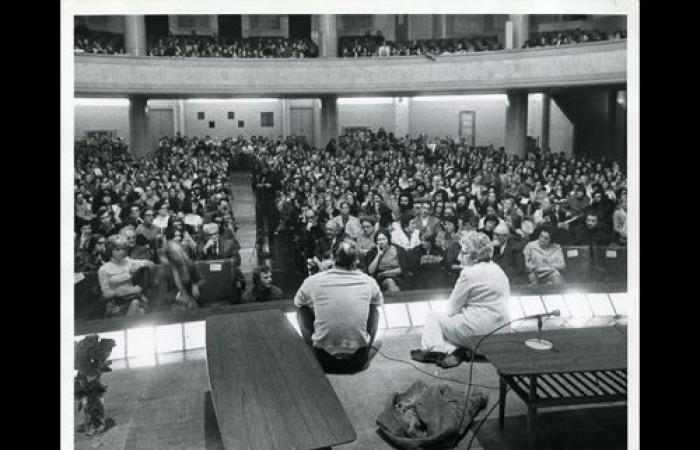More than 12 linear meters of textual documents, 3,000 photographs, 2,000 sound recordings, nearly a hundred video and film recordings, a few objects carefully preserved by their owner: this is the material that the archivists of the Archives and Conservation Division information management at the University of Montreal preserved, classified, boxed and described during a processing project that spanned five months.
Carried out thanks to the financial support of Bibliothèque et Archives nationaux du Québec and a philanthropic donation from Gisèle Barret, this work will promote the exploitation and valorization of archives testifying to a unique personal and professional journey, shaped by Music.
Maryvonne Kendergi: a life in the service of music
Maryvonne Kendergi with friends in Aleppo, 1933. 1 photograph: annotated b&w print.
Credit: UdeM Archives, Maryvonne Kendergi Fund, P0158-L-1
Maryvonne Kendergi was born on August 15, 1915 in Aïntab (today Gaziantep, Turkey), into an Armenian family forced to go into exile in Aleppo, then in Paris. Passionate about music from a very young age, she studied at the École Normale de Musique in Paris (from 1929 to 1933, then from 1937 to 1945) with renowned teachers such as Alfred Cortot and Nadia Boulanger. She led, almost simultaneously, a career as a pianist, piano teacher and organizer of cultural activities until 1952, the year she left the City of Lights for Canada.
It was in Gravelbourg (Saskatchewan), on the local station CFRG, that she cut her teeth as a radio host. While passing through Montreal in 1956, she met Marc Thibault, the director of the French network of -. He offers to host the show Sunday Festivalwhich will become European festivals. This first mandate marks the beginning of a long collaboration between - and Maryvonne Kendergi. During radio and television broadcasts such as Maryvonne’s Thursdays, Maryvonne’s post, The artist and his time et The arts and letters reviewshe will provide a platform for contemporary music and will speak with some of the biggest names on the Quebec, Canadian and international music scenes.
In 1966, Maryvonne Kendergi joined the faculty of the Faculty of Music at the University of Montreal. She gives courses on Canadian music, the first to be offered in a Canadian university establishment, but also gives pride of place to contemporary music. She used her impressive network of acquaintances and friends to establish, in 1970, the Musialogues, a series of meetings between the professor, a composer and the public. Contemporary musicians John Cage, Serge Garant, Pierre Schaeffer, Karlheinz Stockhausen, Gilles Tremblay and Iannis Xenakis are just some of the many guests she will receive.
Committed on several fronts in the name of contemporary music, Maryvonne Kendergi is a founding member of the Société de musique contemporain du Québec, of which she was president from 1973 to 1982, and president of the Canadian Music Council (precursor to the Conseil des arts du Québec). Canada) from 1977 to 1980. When she left UdeM in 1981, she created the Maryvonne-Kendergi Research Fund, thanks to which scholarships are awarded annually to musicology students wishing to explore Quebec music.
What do Maryvonne Kendergi’s archives contain?
Maryvonne Kendergi with Robert Charlebois during a Musialogue at the University of Montreal, 1972. 1 photograph: b&w print.
Credit: UdeM Archives, Maryvonne Kendergi Fund, P0158-L-1
To explore Maryvonne Kendergi’s archives is to delve into a social, cultural, artistic and intimate history that spans nearly a century. An abundant correspondence (several hundred letters and cards!) bears witness to her youth in Paris and her relationships with her family, the friendships she was able to maintain despite time and distance and the multiple encounters that punctuated her activities. pianist, musicologist and presenter. These epistolary exchanges linked her in particular to the painter Alfred Manessier and his family, to the musicians Alfred Cortot, Luigi Dallapiccola, Karlheinz Stockhausen and Iannis Xenakis.
The thousands of photographs in the collection show her sometimes surrounded by friends in Aleppo, sometimes on school benches in Paris, sometimes at the piano, sometimes at the microphone of a radio program or interviewing renowned composers such as Pierre Boulez, John Cage, André Jolivet, Olivier Messiaen or Pierre Schaeffer. Her work as a musicologist and teacher can be traced in the hundreds of files she compiled on musicians from the 20e century and on music and musical events from various countries, in the files of the courses she gave at the University of Montreal or in the documents relating the organization of the Musialogues.
Armenian by origin and heart, Maryvonne Kendergi has also collected numerous documents testifying to her commitment to Armenian associations in Montreal. Added to this archival corpus are some objects as unusual as they are touching, for example buttons from the provisional government of the French Republic, a pack of matches annotated and signed by John Cage or even a fan used by Francis Poulenc.
A heritage to preserve… before it is too late
Sometimes unique witnesses to the work of Maryvonne Kendergi as a host, interviewer and teacher, the several thousand audiovisual documents in the collection are presented on a variety of media whose state of conservation and life expectancy vary: tape magnetic, audio cassette, CD-ROM, videocassette and 16 mm film, in particular.
If the precariousness of this heritage is due to the deterioration of the documents themselves, it is also explained by the obsolescence of the devices and technologies allowing them to be read, not to mention the loss of essential know-how the use and maintenance of this equipment. It is no exaggeration to say that there is an urgent need to act on certain documents, which will simply no longer be readable in just a few years! The preservation of audiovisual archives, therefore, is a priority for the Archives and Information Management Division. A plan for the preservation and digitization of audiovisual archives is also being developed.
In 2025, the Faculty of Music of the University of Montreal will be 75 years old. If major commemorations like those surrounding the founding of this faculty offer ideal opportunities to highlight the archival heritage of UdeM, this heritage deserves attention and care well beyond these one-off celebrations. Preserving this university memory is an institutional and collective responsibility!
To consult the descriptions of Maryvonne Kendergi’s archives, click here.







